Note
in your dn
"퀸는 한국어를 배워요"
it should be "퀸은 한국어를 배워요"
because 퀸 ends in a consonant
when words end in a consonant you use 은 and when words end in a vowel you use 는
You’re correct, I must have just not been paying too close attention while I was typing, I make a ton of typos in English so it’s not surprising that I did so in Korean lol
3 notes
·
View notes
Photo
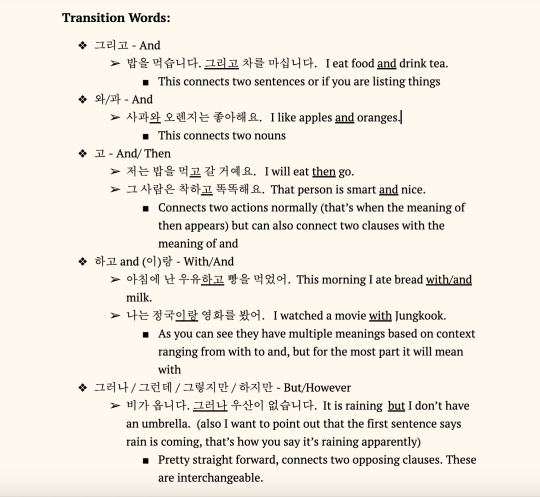

Some notes I took today to put all the transition words I know in an easier to read format
80 notes
·
View notes
Text
잘 vs. 못 and Negative Conjugations Charts
Hey everyone! I’m back with more charts!! I hope you all find them useful! :) This time we have a chart contrasting 잘 and 못, and another showing how to negate sentences!
BTW, I just moved into my dorm at college so it’s been a busy week lol. But I think I’ll still be able to put out content regularly! Just letting y’all know in case some of my posts seem a little lazy or something which I apologize in advance for! :)
If you want to see full-length lessons on these topics, here they are!
Level 1 / Lesson 1: Negative Sentences
Level 2 / Lesson 2: 잘 and 못
Here are the charts!

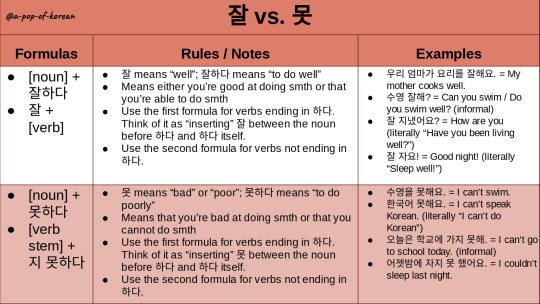
Feel free to ask me any questions you may have!!
If you want to practice writing and reading Korean with others, join my Discord chat here and my Tumblr chat here! Don’t forget to follow my Instagram @apopofkorean too!
Want to expand your Korean vocabulary and get closer to fluency? Get Drops Premium using my affiliate link!
If you would like to donate and support my studies, check out my Ko-Fi! Thank you for your generosity! See you next time! 다음에 봐요!
348 notes
·
View notes
Text
Time Words
언제 - When
부터 - from (usually used when referring to time but can be interchangeable with 에서 in a lot of cases)
지금 - right now
오늘 - today
어제 - yesterday
내일 - tomorrow
아까 - earlier
나중에 - later
48 notes
·
View notes
Text
ㄹ/을까 Meanings
This has multiple meanings based on context.
First is if it is poised as a question then it gives the meaning of “shall (we,you,I)”
(우리가) 밥을 먹을까? Shall we eat rice? (or meal, 밥 literally means rice but can be used just as meal in general)
Second use is as a statement - I intend to/ I am thinking of - add 하다 to the end
그 영화를 볼까 해요. I am thinking of watching that movie.
Third use is another statement - I am worried that/ about - add 봐 (sometimes the word 걱정되다 meaning to worry is added to the end but is dropped sometimes)
그녀가 나를 좋아하지 않을까 봐 걱정돼. I am worried that she will not like me.
46 notes
·
View notes
Photo
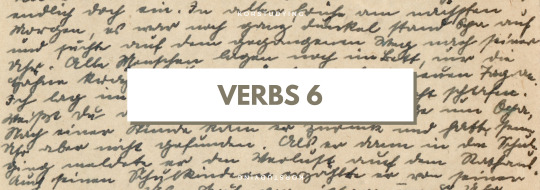
정하다 - to worry
약속하다 - to promise
거짓말하다 - to lie
고백하다 - to confess
죄송하다 - to be sorry
찾다 - to find, to look for
준비하다 - to prepare
가지다 - to have
기억하다 - to remember
꿈꾸다 - to dream
시작하다 - to start
끝나다 - to finish
보내다 - to send
사용하다 - to use
팔다 - to sell
73 notes
·
View notes
Text
Conjugating Tips
sometimes when you conjugate an adjective it is necessary to change letters based on the ending (for this exercise I will conjugate into informal present tense)
if the word ends in ~하 : change to 해 ex. 하다 = 해요
If the word ends with ㅡ : change to ㅓ ex. 크다 = 커요 UNLESS the character before is a ㅏ then turn to ㅏ ex. 나쁘다 = 나빠요 OR there is a ㄹ at the end turn to ㄹ 라 ex. 빠르다 = 빨라요
if the word ends in ㅂ : change to 워 ex. 뜨겁다 = 뜨거워요
if the word ends in ㅣ : change to ㅕ ex. 느리다 = 느려요
if the word has a ㅏ on top and a ㅎ on the bottom : change to ㅐ ex. 삘갛 = 빨개요
23 notes
·
View notes
Photo
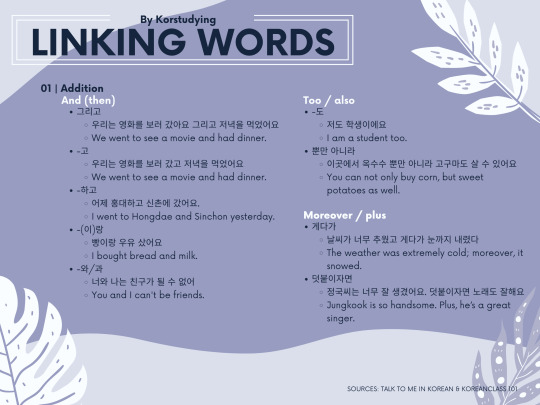
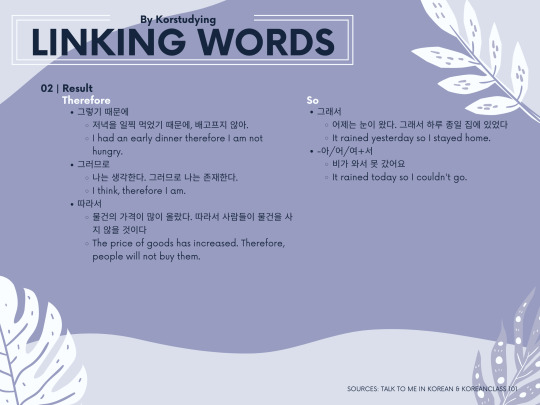

Linking words🔮
It’s one thing to know how to make a sentence, it’s another thing to connect sentences to each other to be able to make a comprehensive story. Here are some of the Korean linking words to do so!💫
311 notes
·
View notes
Text
Vocabulary Lists
HFV (High Frequency List of Words, aka the most used words in Korean)
Places
Jobs
Hobbies
Continents
Transport
Merry Christmas
Exclamations
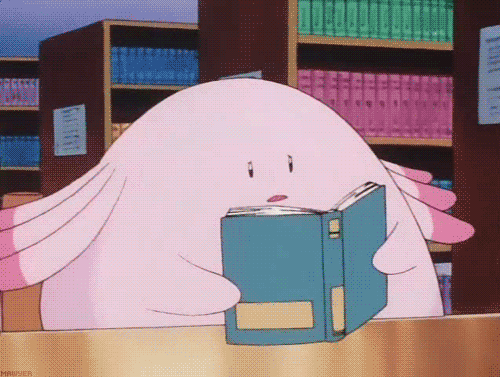
287 notes
·
View notes
Text
Small list of Korean Adjectives
These are written in dictionary form you can look at my post HERE to learn how to conjugate and use adjectives in Korean :)
Angry= 화나다
Annoyed/Irritated= 짜긍나다
Bad= 나쁘다
Beautiful= 아름답다
Big= 크다
Bitter= 쓰다
Bored= 심심하다
Boring= 지루하다
Brave= 씩씩하다
13 notes
·
View notes
Text
Korean Adjectives
Adjectives in Korean show up in dictionary form with the ~다 ending like verbs and need to be conjugated. All sentences in Korean should end with a verb or an adjective btw.
There are two ways to express adjectives, the first before the noun and the second after the noun.
Ex. Quinn is smart = 퀸은 똑똑해요. 똑똑하다 means smart in dictionary form and you conjugate it into present tense with 아요 (어요 if it ends in a consonant) but notice I did not write 똑똑하아요, while technically correct it sounds weird so 하아 gets changed to 해
Smart Quinn = 똑똑한 퀸 Here you can see that I conjugated 똑똑하다 with ~ㄴ if it ends with a consonant with you would put ~은 Ex. 좋다 = 좋은
The first example is a complete sentence, the second one isn’t. If you wanted to add a verb to the sentence then you would use the second example.
Ex. Smart Quinn reads = 똑똑한 퀸은 읽어요.
3 notes
·
View notes
Text
Hello!
안녕하세요! 내 이름은 퀸이에요. 나는 21실 이에요 그리고 미국 사람이에요. 만나서 반갑습니다~
4 notes
·
View notes
Text
Colors
Color= 색깔
Black= 감정색
Blue= 파란색
Brown= 갈색
Gold= 금색
Gray= 희색
Green= 초록색
Orange= 주황색
Pink= 분홍색
Purple= 보라색
White= 하얀색
Yellow= 노란색
30 notes
·
View notes